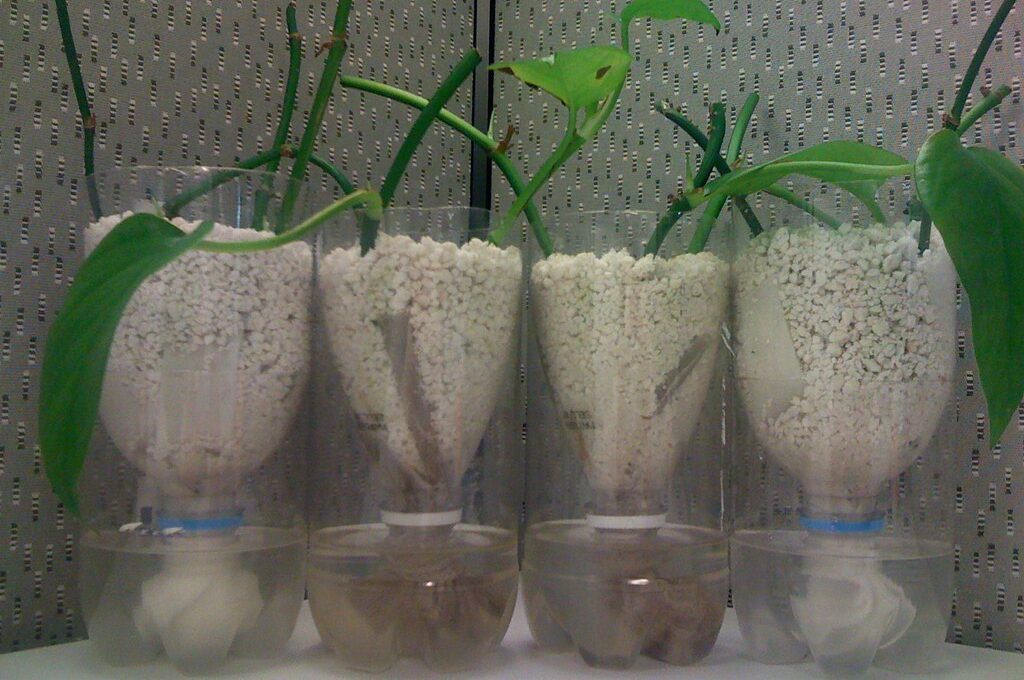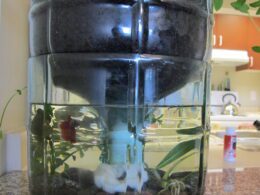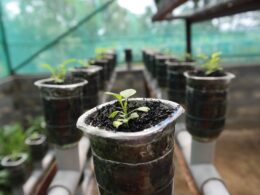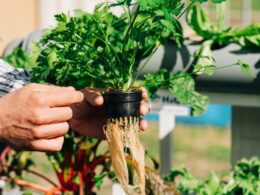If you’re new to hydroponics, you may be wondering if these systems require regular cleaning. The short answer is yes, just like any other growing system, hydroponics need to be cleaned to ensure the health of your plants. Neglecting to clean your hydroponic system can lead to the buildup of harmful bacteria, algae, and other contaminants that can harm your plants and compromise your yield.
Cleaning your hydroponic system doesn’t have to be a daunting task, and the benefits are well worth the effort. Not only will regular cleaning help keep your plants healthy, but it can also extend the life of your equipment and prevent costly repairs.
In this article, we’ll explore the importance of regular cleaning, how often to clean your hydroponic system, and share tips to keep your system clean and running smoothly.
The Importance of Regular Cleaning
Keeping your hydroponic system clean is crucial for ensuring healthy plant growth and preventing potential disasters. Neglecting to clean your hydroponic system regularly can lead to a build-up of harmful bacteria, algae, and fungi. These pathogens can infect your plants, cause root rot, and even spread to other plants in your system. To avoid this, it’s essential to establish a regular cleaning routine.
Using natural cleaning methods has many benefits. These methods are safe for your plants, prevent chemical residue from harming your plants, and are environmentally friendly. Some natural cleaning methods include using vinegar, hydrogen peroxide, and citric acid. These substances are effective at killing harmful bacteria, fungi, and algae without damaging your plants.
With regular cleaning using natural cleaning methods, you can ensure that your hydroponic system remains healthy and your plants grow strong. If you neglect to clean your hydroponic system, you run the risk of your plants becoming infected with harmful pathogens. The risks of not cleaning your system regularly include root rot, stunted growth, and even plant death.
Additionally, the build-up of sediment and debris can clog your system’s pipes, leading to water overflow and flooding. Regular cleaning can prevent these disasters from occurring, ensuring your plants stay healthy and your hydroponic system remains functional.
How Often to Clean Hydroponic Systems
When it comes to cleaning your hydroponic system, there are a few factors that will affect how often you need to do it. Factors such as the size of your system, the type of plants you’re growing, and the quality of your water can all play a role in determining the frequency of cleaning.
Generally, it’s recommended that you clean your hydroponic system at least once every two weeks to prevent the buildup of algae and other contaminants.
Factors that affect cleaning frequency
You’ll want to pay attention to factors that impact how often your hydroponic system requires cleaning. One important factor is the type of plants you’re growing. Some plants, like tomatoes and cucumbers, produce more waste and require more frequent cleaning.
Additionally, if you use organic nutrients, you may need to clean your system more often to prevent buildup and clogs.
Another factor to consider is the size of your hydroponic system. Larger systems may require more frequent cleaning as they have more water and nutrients flowing through them. Additionally, if you have a lot of plants in your system, they may produce more waste and require more cleaning.
It’s important to find a cleaning frequency that works for your specific hydroponic setup to ensure optimal plant growth and cleaning efficiency.
Recommended cleaning schedules
It’s important to establish a regular cleaning schedule to maintain the health and productivity of your hydroponic plants. Neglecting to clean your system can lead to a buildup of algae, bacteria, and other harmful pathogens that can stunt plant growth and even cause plant death.
Here are some recommended cleaning schedules to ensure the longevity of your hydroponic garden:
-
Weekly cleaning: wipe down the walls and floor of your hydroponic system with a soft cloth to remove any excess debris or algae buildup.
-
Monthly cleaning: empty out the nutrient solution and clean the reservoir with a gentle, organic cleaner to remove any hard water buildup or mineral deposits.
-
Bi-annual cleaning: disassemble your hydroponic system and clean all components with a chemical cleaner to sanitize and remove any stubborn bacteria or pathogens that may have accumulated.
When it comes to cleaning equipment, it’s important to use non-abrasive materials that won’t scratch or damage your hydroponic system. Organic cleaners are a great option for routine maintenance, as they are gentle on both your plants and the environment. However, for deeper cleaning and sanitation, chemical cleaners may be necessary. Always read the labels and follow the instructions carefully to ensure proper use and avoid any potential harm to your plants.
Steps for Cleaning Hydroponic Systems
Make sure to regularly clean your hydroponic system to prevent any potential issues and ensure healthy plant growth. Cleaning your hydroponic system should be done on a regular basis to keep it free from any harmful bacteria, algae, or other contaminants that may hinder your plants from growing properly. You don’t want to compromise the health of your plants by failing to maintain a clean hydroponic system.
Cleaning your hydroponic system involves specific steps that must be followed to ensure that it is properly cleaned. First, you should remove all the water from the system, then use a cleaning solution to disinfect the entire system. You should make sure that you use the right cleaning solution and that it is properly diluted. After disinfecting the system, you should rinse it with clean water and allow it to dry before refilling it with fresh water and nutrients.
Proper cleaning tools and maintenance are essential for keeping your hydroponic system in good condition. You should have all the necessary cleaning tools such as a scrub brush, a cleaning solution, and gloves. Also, you should be careful when disposing of the used cleaning solution and other materials to avoid contaminating the environment.
Regular cleaning and maintenance of your hydroponic system will ensure that your plants are healthy and that you have a bountiful harvest.
Is Using Dirt in Hydroponics More Prone to Dirty Systems?
Using dirt in hydroponics may lead to dirty systems. While hydroponics systems typically rely on a soilless medium, the practice of introducing dirt can result in clogged pipes or filters due to its fine particles. This can hinder nutrient distribution, impacting plant growth. It’s advisable to avoid using dirt in hydroponics to maintain clean, efficient systems.
Common Mistakes to Avoid
When it comes to cleaning your hydroponic system, there are some common mistakes you should avoid.
First, don’t use harsh chemicals that could damage your plants or contaminate your system.
Second, make sure you clean all components thoroughly, including pumps, tubing, and reservoirs.
And finally, don’t overlook the importance of cleaning during plant cycles to prevent buildup and maintain optimal conditions.
By avoiding these mistakes, you can keep your hydroponic system running smoothly and ensure healthy plant growth.
Using harsh chemicals
You’ll want to avoid using harsh chemicals when maintaining your hydroponic system to ensure it remains healthy and free of any harmful substances. While it may be tempting to use strong chemicals to quickly clean your system, these can leave behind residue that can be harmful to your plants and even to yourself.
Instead, look for safe alternatives and eco-friendly options to keep your hydroponic system clean. One option is to use natural cleaning agents such as vinegar or hydrogen peroxide. These are effective in cleaning your system without leaving behind any harmful residue.
Another option is to use specialized cleaning products designed specifically for hydroponic systems. These products are formulated to clean your system without damaging any of the delicate components. By avoiding harsh chemicals and using safe alternatives, you can keep your hydroponic system healthy and productive for years to come.
Neglecting to clean all components
Neglecting to clean all components can lead to the buildup of harmful substances in your system, ultimately affecting the health of your plants. It’s easy to overlook certain parts of your hydroponic setup, but doing so can have serious consequences.
Here are some potential consequences and sanitation concerns to keep in mind:
-
Algae growth: A dirty system can provide the perfect environment for algae to thrive. Not only is it unsightly, but it can also clog your system and deprive your plants of necessary nutrients.
-
Pest infestations: Neglecting to clean trays, pots, and other components can attract pests like spider mites, fungus gnats, and aphids. These pests can damage your plants and spread disease throughout your system.
-
pH imbalance: A buildup of organic matter can change the pH levels in your system, making it difficult for plants to absorb nutrients properly.
-
Disease spread: Dirty components can harbor harmful bacteria, viruses, and fungi that can quickly spread throughout your system and cause widespread damage.
To avoid these issues, it’s important to clean all components of your hydroponic system regularly. This includes trays, pots, tubing, pumps, and any other parts that come into contact with water or nutrients. By maintaining a clean and sanitary system, you can ensure the health of your plants and avoid costly setbacks.
Overlooking cleaning during plant cycles
It’s crucial to keep up with cleaning during plant cycles to prevent harmful substances from building up and affecting your plants’ health. Neglecting to clean your hydroponic system during the plant cycle is a common mistake that can have serious consequences. As your plants grow, they will naturally produce waste, which can accumulate in the system and lead to the growth of harmful bacteria and fungi.
To avoid these consequences, make sure to clean your hydroponic system regularly during the plant cycle. This will help prevent the buildup of harmful substances and ensure that your plants are healthy and thriving. Here is a table that outlines some common cleaning mistakes and the consequences of neglecting cleaning during the plant cycle:
| Common Cleaning Mistakes | Consequences of Neglecting Cleaning |
|---|---|
| Not cleaning the reservoir regularly | Nutrient imbalances, harmful bacteria growth |
| Neglecting to clean the grow medium | Root rot, nutrient deficiencies |
| Forgetting to clean the air stones | Poor oxygenation, clogged stones |
| Failing to clean the tubing | Blockages, nutrient deficiencies |
By keeping up with regular cleaning during the plant cycle, you can avoid these issues and ensure that your hydroponic system is functioning at its best. Remember, a little bit of maintenance can go a long way in keeping your plants healthy and thriving.
Tips for Maintaining a Clean Hydroponic System
Keeping your hydroponic system clean is essential for healthy plant growth and a thriving environment. Neglecting to clean your system can lead to the accumulation of harmful bacteria, algae growth, and nutrient imbalances. To prevent these issues, follow these tips for maintaining a clean hydroponic system:
-
Regularly clean your reservoir: The reservoir is the heart of your hydroponic system, and it’s essential to keep it clean. Use a cleaning solution to scrub the reservoir walls and remove any debris or buildup. Rinse thoroughly before refilling with fresh water and nutrients.
-
Use a preventative measure to prevent algae growth: Add a UV sterilizer or hydrogen peroxide to your reservoir to prevent algae growth. This will keep your nutrient solution clean and reduce the risk of clogging your system.
-
Maintain proper pH and nutrient levels: Regularly check the pH and nutrient levels in your reservoir to ensure they are within the appropriate range. This will help prevent nutrient imbalances and the growth of harmful bacteria.
In addition to cleaning your reservoir, it’s important to clean all other parts of your hydroponic system, including pumps, tubing, and grow trays. Regularly sanitize these components to prevent the buildup of harmful bacteria and other organisms.
By following these tips, you can ensure a safe and healthy environment for your plants to thrive in. Remember, a clean hydroponic system is the key to a successful harvest.
Frequently Asked Questions
What are some cleaning solutions that can be used for hydroponic systems?
Keeping your hydroponic system clean is crucial for the health of your plants. The frequency of cleaning depends on the type of system you have and how often you use it.
For example, deep water culture systems should be cleaned every two weeks, while drip systems can go up to a month between cleanings.
When it comes to types of cleaners, you’ll want to use something that is safe for your plants and won’t leave any residue. A mixture of water and vinegar is a great natural option, while hydrogen peroxide can be used for more stubborn buildup.
Regular cleaning will not only keep your plants healthy, but it will also prevent the growth of harmful bacteria and algae in your system.
Can I use bleach to clean my hydroponic system?
When it comes to cleaning your hydroponic system, using bleach can have both pros and cons. On the plus side, bleach is a powerful disinfectant that can kill harmful bacteria and fungi that may be lurking in your system. However, it’s important to use bleach in moderation as it can also be harmful to your plants and may damage your equipment if not diluted properly.
Alternatively, there are other cleaning options available for hydroponic systems that are less harsh on your plants and equipment, such as hydrogen peroxide or vinegar. Whichever cleaning solution you choose, it’s important to keep your system clean and free of debris to ensure the health and safety of your plants.
How can I prevent algae growth in my hydroponic system?
To prevent algae growth in your hydroponic system, it’s important to maintain the pH levels of your nutrient solution. Algae thrives in an environment that has a high pH level, so it’s crucial to keep it at a balanced level between 5.5-6.5.
Additionally, you can use a variety of techniques to block out light, which is necessary for algae to grow. Try using opaque materials or covering your system with a black cloth to block out any unwanted light.
It’s also a good idea to regularly check your system for any signs of algae growth and remove it immediately if you see any.
By being consistent with pH maintenance and taking precautions to block out any light, you can effectively prevent algae growth in your hydroponic system.
Do I need to clean my hydroponic system if I’m using organic nutrients?
Using organic nutrients in your hydroponic system can provide many benefits, including better taste and nutrition in your plants. However, it’s important to keep in mind that even when using organic nutrients, cleaning your system is still necessary for optimal plant growth.
Algae and other debris can still accumulate in your system, leading to clogs and reduced nutrient uptake. Regular cleaning can help prevent these issues and ensure that your plants are getting the most out of their nutrients.
So, while organic nutrients are a great choice for hydroponics, don’t neglect the impact that cleaning can have on your plant’s growth and overall health.
Can I clean my hydroponic system while my plants are still growing?
If you want your hydroponic plants to thrive, it’s important to regularly clean your system. This will prevent the buildup of harmful bacteria and keep your plants healthy.
But how can you do this without disrupting plant growth? Here are some tips:
- First, avoid using harsh chemicals, as they can harm your plants. Instead, use natural cleaning solutions like vinegar or hydrogen peroxide.
- Second, try to clean your system during a time when your plants are less sensitive, such as during the vegetative stage.
- Lastly, be sure to rinse your system thoroughly after cleaning to remove any leftover cleaning solution.
By following these tips, you can enjoy the benefits of regularly cleaning your hydroponic system without putting your plants at risk.
Conclusion
Congratulations, you’ve successfully learned about the importance of cleaning your hydroponic system! Regular cleaning is crucial to keep your plants healthy and thriving. Neglecting to clean your system can lead to the growth of harmful bacteria, fungi, and algae, which can harm your plants and even cause them to die.
Now that you know why cleaning is important, it’s time to learn how often to clean your hydroponic system and the steps to take when cleaning it. Remember to avoid common mistakes, such as using harsh chemicals or not rinsing thoroughly, and to always maintain a clean environment to prevent contamination.
By following these tips, you can ensure that your hydroponic system stays healthy and produces a bountiful harvest. Happy growing!








